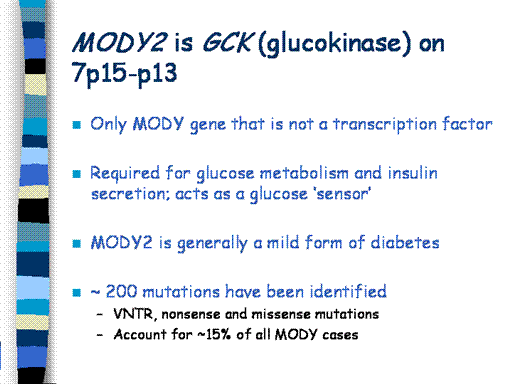| front |1 |2 |3 |4 |5 |6 |7 |8 |9 |10 |11 |12 |13 |14 |15 |16 |17 |18 |19 |20 |21 |22 |23 |24 |25 |26 |27 |28 |29 |30 |31 |32 |33 |34 |35 |36 |37 |38 | 39 |40 |41 |42 |43 |44 |45 |46 |47 |48 |49 |50 |51 |52 |53 |54 |review |
 |
MODY2
is due to mutations in the glucokinase gene (GCK; OMIM 138079) on
chromosome 7p15-p13. This is the
only MODY gene that does not regulate the expression of other genes.
Rather, the GCK gene is required for glucose metabolism and insulin
secretion. Thus, the clinical
course of MODY2 patients differs from the prognosis associated with
other types of MODY.
Glucokinase
alerts pancreatic beta cells that glucose is present, and therefore acts
as a glucose sensor. Mutations in
this gene reduce the beta-cell secretory response to glucose, which
leads to chronic hyperglycemia.
MODY2
is characterized by a mild stable fasting hyperglycemia with a decline
in pancreatic islet
cell
function over
time. It has also been associated
with gestational diabetes, T2D, and possibly T1D.
Many
patients with
MODY2 are treated with diet alone.
Approximately 200 genetic variants
have been
identified,
including VNTR polymorphisms, nonsense and missense mutations.
MODY2 accounts for ~15% of all MODY cases.
|